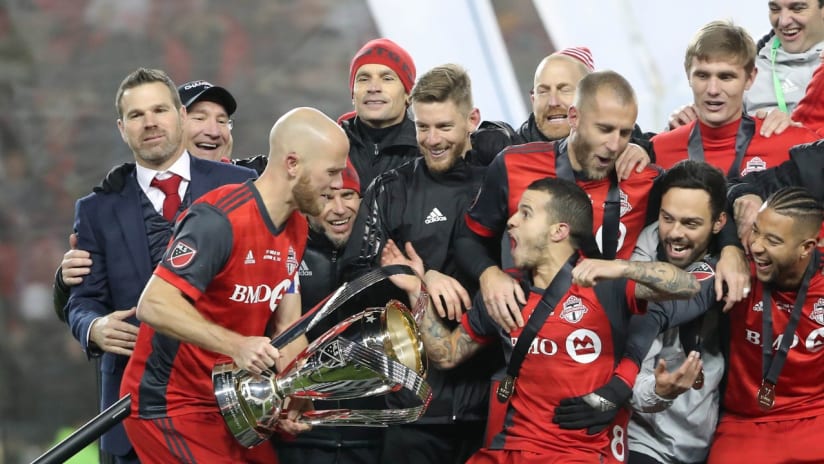Younger MLS viewers may not realize it, but there was once a time when the overwhelming emotion for a typical Toronto FC fan was shame.
The Reds rolled into MLS in 2007 on a euphoric wave of support, capturing the imagination of their city and drawing huge crowds to what was at the time a much more basic BMO Field than the expanded and remodeled version they enjoy today.
TFC were the Seattle before Seattle, if you will, raising expectations league-wide with the degree of passion and coverage they drew in their local market. It took them several games to score their first MLS goal, but when Danny Dichio finally found the net it sparked an unforgettable celebration as a blizzard of seat cushions – that game’s promotional gift – flew down from the stands.
But unlike the Sounders, they didn’t have a quality product to savor in those early years. Far from it. The Reds were woeful in their first several seasons under multiple different technical staffs and organizational strategies, leading one of their own players, Dutch striker Danny Koevermans, to balefully dub them “the worst team in the world” in 2012.
The shift began in September 2013 when Tim Bezbatchenko, then a little-known figure outside MLS executive inner circles, left the league’s headquarters office to become TFC’s general manager. A year later, Michael Bradley was lured from Serie A’s AS Roma on what remains one of the league’s highest salaries, one of several splashy Designated Player signings that also included English international Jermain Defoe. The latter's arrival was cheekily dubbed “A Bloody Big Deal.”
Despite producing, Defoe ended up returning to England and the Premier League after the 2014 campaign. But it was two acquisitions who made the trek across the Atlantic in the other direction that finally pushed Toronto over the playoff hurdle that eluded them in their first eight seasons.
Sebastian Giovinco, a relative unknown to North American fans despite his Juventus pedigree, immediately turned into MLS' most dangerous and complete offensive talent. And longtime US international forward Jozy Altidore returned to the league he'd departed as a teenager. The end product was a club that finished sixth, five points above the playoff line.
A four-game winning streak toward the end of 2015 foreshadowed a stellar run of nearly two calendar years that would begin the following the summer. Spurred on partly by Greg Vanney's decision to turn to young goalkeeper Alex Bono, The Reds lost only two of their last 15 regular season games to finish third in the East, then outscored their postseason opponents 17-6 en route to hosting the 2016 MLS Cup.
That year ended in the heartbreak of the heroics by Sounders goalkeeper Stefan Frei. But Toronto turned the pain of that moment it into arguably the most complete season in MLS history in 2017. When it was over, Toronto had completed the first-ever MLS domestic treble.
In terms of singular achievements, Toronto's best moment may have come the following spring, when they defeated two storied Liga MX opponents in UANL Tigres and Club America in the Concacaf Champions League to reach the final. But more heartbreak on penalties followed, this time against Chivas in Guadalajara. The demands of continental competition wreaked havoc on the club's health as well, and TFC limped through the remainder of the MLS regular season while finishing beneath the playoff line.
By the following spring, Giovinco had been transferred to a Saudi Arabian club, and a new playmaking hope, Alejandro Pozuelo, had been brought in from Belgium's top flight. And with LAFC's dazzling regular season, the rise of New York City FC in the east, and the individual scoring accomplishments of Carlos Vela and Zlatan Ibrahimovic, Toronto almost became overshadowed. But then the Audi 2019 MLS Cup Playoffs began. And when the dust cleared, it was Vanney's side again emerging to face Seattle for MLS' top prize.













